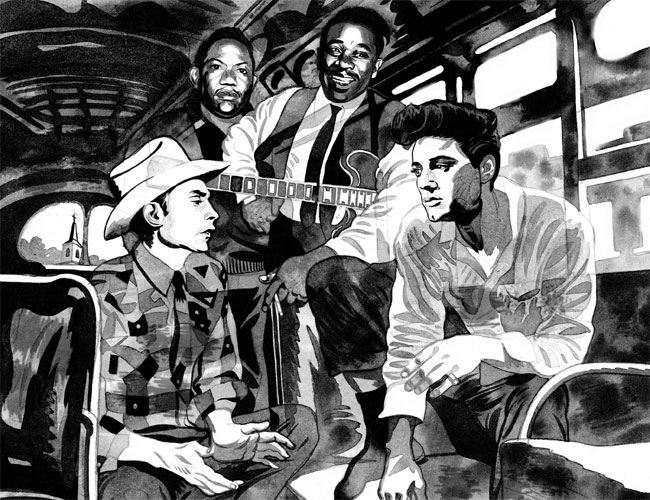
By Peter Gurlnick
The New York Times, August 11, 2007
ONE of the songs Elvis Presley liked to perform in the ’70s was Joe South’s “Walk a Mile in My Shoes,” its message clearly spelled out in the title.
Sometimes he would preface it with the 1951 Hank Williams recitation “Men With Broken Hearts,” which may well have been South’s original inspiration. “You’ve never walked in that man’s shoes/Or saw things through his eyes/Or stood and watched with helpless hands/While the heart inside you dies.” For Elvis these two songs were as much about social justice as empathy and understanding: “Help your brother along the road,” the Hank Williams number concluded, “No matter where you start/For the God that made you made them, too/These men with broken hearts.”
In Elvis’s case, this simple lesson was not just a matter of paying lip service to an abstract principle.
It was what he believed, it was what his music had stood for from the start: the breakdown of barriers, both musical and racial. This is not, unfortunately, how it is always perceived 30 years after his death, the anniversary of which is on Thursday. When the singer Mary J. Blige expressed her reservations about performing one of his signature songs, she only gave voice to a view common in the African-American community. “I prayed about it,” she said, “because I know Elvis was a racist.”
And yet, as the legendary Billboard editor Paul Ackerman, a devotee of English Romantic poetry as well as rock ’n’ roll, never tired of pointing out, the music represented not just an amalgam of America’s folk traditions (blues, gospel, country) but a bold restatement of an egalitarian ideal. “In one aspect of America’s cultural life,” Ackerman wrote in 1958, “integration has already taken place.”
It was due to rock ’n’ roll, he emphasized, that groundbreaking artists like Big Joe Turner, Ray Charles, Chuck Berry and Little Richard, who would only recently have been confined to the “race” market, had acquired a broad-based pop following, while the music itself blossomed neither as a regional nor a racial phenomenon but as a joyful new synthesis “rich with Negro and hillbilly lore.”
No one could have embraced Paul Ackerman’s formulation more forcefully (or more fully) than Elvis Presley.
To read the rest of Gurlnick’s article, click HERE
